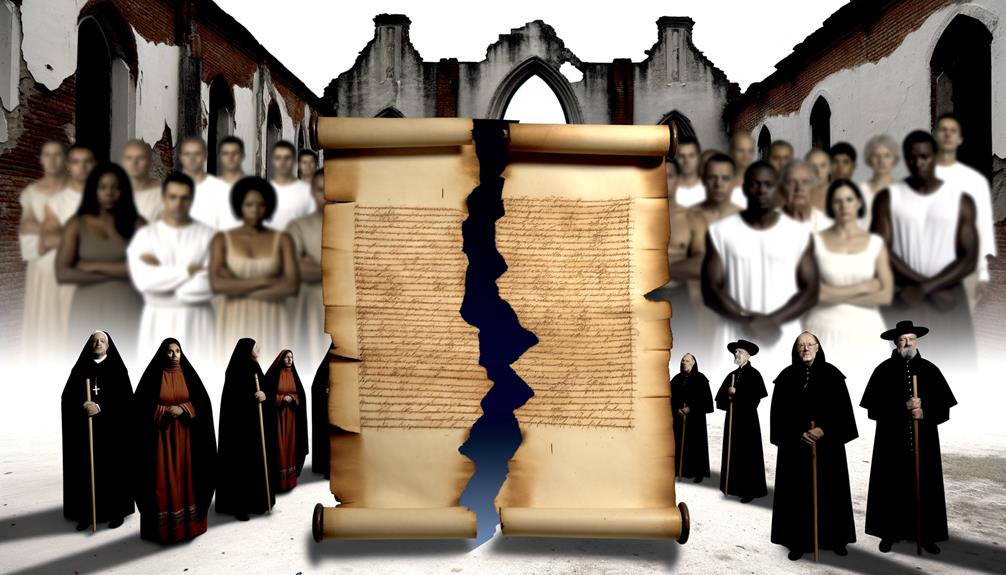Party Spirit Meaning in the Bible: Division and Strife
In the Bible, the ‘party spirit‘ denotes the harmful inclination to form factions within a community, driven by personal or ideological interests. This divisions undermine the unity that Christ and the apostles, particularly Paul, stressed.
Scriptural passages such as 1 Corinthians 1:10-13 and Galatians 5:19-21 highlight the destructive nature of party spirit, associating it with the works of the flesh. Historically, early Church struggles against such divisions underline the spiritual and communal harm caused by factionalism. These passages serve as a reminder that unity in faith is paramount for spiritual growth and harmony within the community. The metaphor of a ‘winepress in biblical context‘ further illustrates how believers can be subjected to pressure and trials, yet are called to be refined through these experiences rather than divided. Emphasizing love and reconciliation, the Church is urged to rise above such tensions, fostering a collective identity rooted in Christ.
Unity grounded in Christ’s teachings is essential for preserving the Church’s integrity and efficacy. Discover more about overcoming this divisive spirit through biblical principles.

Party Spirit Meaning in the Bible: Division, Pride, and the Call to Unity
| Aspect | Details |
|---|---|
| Definition | A divisive attitude that promotes factions, cliques, or loyalty to human leaders over Christ |
| Biblical References | 1 Corinthians 1:10–13, Galatians 5:20 |
| Root Causes | Pride, jealousy, selfish ambition, and spiritual immaturity |
| Spiritual Consequences | Disunity in the body of Christ, weakened witness, and conflict among believers |
| Spiritual Lesson | Urges believers to pursue humility, unity, and Christ-centered fellowship |
Definition of Party Spirit

In theological terms, ‘party spirit‘ refers to the tendency to form factions or divisions within a community, often driven by personal interests or ideological differences, and is considered contrary to the unity advocated in the Bible.
This concept underscores the destructive nature of internal discord, which can erode collective harmony and spiritual integrity.
Theologically, such divisions are seen as manifestations of human fallibility and a deviation from divine principles of communal solidarity and love.
Understanding ‘party spirit’ necessitates recognizing how personal ambitions and doctrinal disagreements can fragment a religious community, undermining its witness and mission.
It invites a reflective analysis on maintaining doctrinal purity while fostering an inclusive, united fellowship, as envisioned in Christian teachings.
Biblical References

The concept of ‘party spirit‘ is expressly addressed in several biblical passages, highlighting its detrimental impact on the unity and spiritual health of the Christian community.
In 1 Corinthians 1:10-13, Paul admonishes the Corinthian church for divisions, urging believers to be unified in mind and judgment.
Galatians 5:19-21 lists ‘dissensions‘ and ‘factions’ among the works of the flesh, condemning them as contrary to the Spirit.
James 3:14-16 warns against bitter envy and selfish ambition, which foster disorder and evil practices.
Historical Context

Understanding the historical context of ‘party spirit‘ in biblical times provides essential insight into the socio-religious dynamics that shaped early Christian communities.
The term ‘party spirit’ often refers to divisive factions within the Church, a phenomenon that can be traced back to the Greco-Roman world, where philosophical schools and political parties were prevalent.
Early Christians, emerging from diverse backgrounds, including Judaism and paganism, brought with them differing theological perspectives and cultural practices. This diversity often led to internal conflicts and the formation of cliques, threatening the unity of the nascent Church.
The Apostle Paul’s epistles, especially to the Corinthians, address these divisions, emphasizing unity in Christ as paramount.
Understanding this context helps elucidate the biblical admonishments against such factions.
Early Church Warnings

Drawing upon the historical context, early church leaders issued stern warnings against the emergence of ‘party spirit’ to preserve the unity and doctrinal purity of their congregations. The nascent Christian communities faced internal divisions driven by differing interpretations and allegiances, threatening the fabric of communal harmony.
These warnings were not merely rhetorical but were grounded in theological concerns, emphasizing the centrality of Christ and the dangers of factionalism.
| Leader | Warning Issued | Scriptural Reference |
|---|---|---|
| Peter | Unity in Christ | 1 Peter 3:8 |
| John | Love one another | 1 John 4:7 |
| James | Avoid partiality | James 2:1 |
| Jude | Beware of divisions | Jude 1:19 |
This vigilant stance was essential for maintaining the integrity and mission of the early church.
Paul’s Teachings

In his epistles, Paul consistently addressed the issue of ‘party spirit,’ emphasizing the need for unity and the centrality of Christ to counteract the divisive tendencies within the early Christian communities.
Paul’s letters to the Corinthians are particularly instructive, revealing his concern about factions claiming allegiance to different leaders (1 Corinthians 1:12). He underscored that such divisions detract from the gospel’s message, stressing that Christ is not divided (1 Corinthians 1:13).
Paul’s theological stance is rooted in the doctrine of the body of Christ, where all members, though diverse, are integral to the whole (1 Corinthians 12:12-27). He called for a focus on shared faith in Christ, rather than personal or group superiority.
Jesus on Unity

Jesus emphasized the importance of unity among His followers, particularly in His prayer for all believers to be one, just as He and the Father are one (John 17:21). This profound theological assertion underscores a divine model of unity, reflecting the intrinsic harmony within the Trinity.
Contextually, Jesus’ plea for unity is situated within His final discourse, highlighting the gravity of communal coherence. Theologically, this unity transcends mere agreement and points towards a spiritual oneness that mirrors divine relationships.
It suggests that the unity of believers is not just an ideal but a reflection of divine nature.
Consequently, Jesus’ prayer calls for a deeper, spiritually-rooted unity that counters any divisions, fostering a collective witness to the world.
Consequences of Division

Theological discord within the Christian community often leads to a fracturing of spiritual unity, undermining the collective witness and mission of the Church. When divisions arise, they not only weaken internal cohesion but also impair the Church’s credibility in the eyes of the world.
Biblically, the Apostle Paul admonished the Corinthians for their factionalism, highlighting that such divisions detract from the message of Christ (1 Corinthians 1:10-13). The consequences of division can be categorized as follows:
| Consequences | Biblical References | Implications |
|---|---|---|
| Weakening of Unity | 1 Corinthians 1:10-13 | Diminished communal strength |
| Loss of Credibility | John 17:21 | Erosion of external trust |
| Impaired Witness | Ephesians 4:3 | Reduced evangelistic effectiveness |
| Spiritual Fragmentation | Galatians 5:15 | Internal conflicts and disarray |
This table outlines how division affects the Church both internally and externally.
Modern Implications

Modern ecclesiastical communities, much like their early counterparts, grapple with the pervasive issue of division, which continues to challenge their spiritual integrity and societal influence.
In our contemporary context, denominationalism and ideological schisms often mirror the ‘party spirit’ condemned in the New Testament. These divisions can erode the unity that Christ emphasized, diluting the collective witness of the Church.
Additionally, the rise of digital communication has exacerbated factionalism, as differing theological and doctrinal perspectives become more visible and contentious. This fragmentation undermines the Church’s mission of embodying a unified body of Christ.
Therefore, understanding the biblical admonition against party spirit is essential for fostering a cohesive, spiritually robust community that can effectively engage with the modern world.
Overcoming Factionalism

To overcome factionalism within the Church, it is vital to prioritize the principles of unity and reconciliation as foundational tenets of Christian doctrine. A thorough examination of biblical teachings reveals that division undermines the Church’s mission.
Here are four key strategies to address factionalism:
- Scriptural Adherence: Consistently apply biblical teachings that emphasize love and forgiveness.
- Spiritual Maturity: Encourage believers to grow in spiritual maturity, focusing on common faith rather than personal differences.
- Leadership Accountability: Guarantee church leaders exemplify unity, setting a standard for the congregation.
- Conflict Resolution: Develop effective mechanisms for resolving disputes, based on biblical principles.
Analyzing these strategies within their theological and contextual frameworks can foster a more harmonious and unified church community.
Promoting Unity

Building upon the strategies to overcome factionalism, fostering unity within the Church requires a concerted effort to embody the teachings of Christ, who advocated for a cohesive and loving community. This involves prioritizing mutual respect, shared purpose, and active communication. Paul’s epistles frequently emphasize the importance of unity, urging believers to embrace humility and patience.
| Biblical Principle | Application in Church Life | Scriptural Reference |
|---|---|---|
| Humility | Leaders serve with humility | Philippians 2:3 |
| Patience | Resolve conflicts calmly | Ephesians 4:2 |
| Mutual Respect | Honor differing viewpoints | Romans 12:10 |
Key Takeaways

The key takeaways from understanding party spirit within the biblical context include recognizing the essential role of unity, humility, and mutual respect in fostering a cohesive and spiritually robust Church community. These principles are vital for counteracting divisions and discord that can undermine collective spiritual growth.
- Unity: Maintaining a united front is essential for the Church to effectively embody Christ’s teachings and mission.
- Humility: Valuing others above oneself helps mitigate the pride that often fuels factionalism.
- Mutual Respect: Cultivating respect for diverse perspectives within the Church strengthens communal bonds.
- Scriptural Adherence: Regular engagement with Scripture guarantees alignment with divine principles over personal agendas.
These elements collectively support a harmonious and faithful Church environment.
Conclusion
The concept of ‘party spirit‘ in the Bible underscores the dangers of division and factionalism within the faith community. Paul’s teachings in particular highlight the need for unity and collective harmony.
Historically, the early church faced significant challenges from internal factions. Modern implications suggest that overcoming these divisions remains essential.
Significantly, a 2019 Pew Research study found that 65% of Christians believe their denominations are more divided today, emphasizing the pressing need for unity in contemporary faith practices.






